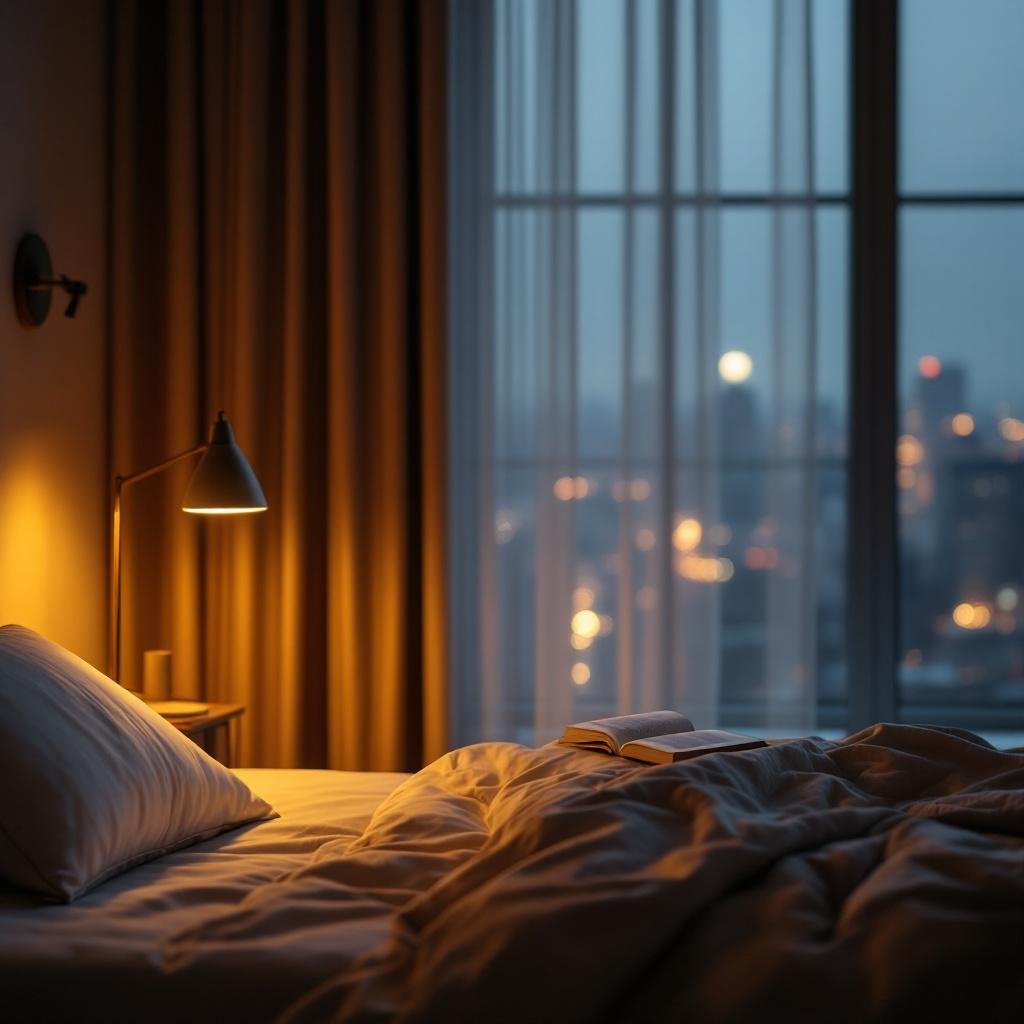“The most successful minds don’t start their day with productivity.
They start the night with peace.”
For CEOs, athletes, artists, and thinkers who operate at the top of their fields, sleep isn’t a luxury or an afterthought, it’s a strategy. While most of the world collapses into bed after a final scroll, high-performing individuals treat nighttime like a ritual for resetting the mind, recovering the body, and preparing the next day with clarity.
Sleep is their unfair advantage.
But the rituals that help them sleep deeply aren’t complicated or expensive.
They are intentional, calm, and built on a simple belief:
A clear mind at night creates a powerful mind in the morning.

Why Successful Minds Protect Their Nights
The world celebrates morning routines, the 5 AM workouts, the cold plunges, the journaling, the hustle. But few talk about the night routines that make those mornings possible.
Elite performers understand something most people overlook:
• Sleep is when memory upgrades
• Sleep is when creativity reconnects
• Sleep is when the nervous system resets
Research shows that high quality sleep enhances problem solving, emotional intelligence, discipline, leadership, patience, and long term decision making the exact qualities that separate average from extraordinary.
So the question becomes:
If the world’s most effective minds guard their nights so carefully…
What do they do differently from the rest of us?
The CEO Approach: Creating a Boundary Between Day and Night
High level executives handle decisions that affect thousands or even millions of lives. Their brains run fast, hold pressure, and process constant complexity. If they don’t detach at night, their mind stays in work mode, leading to restless sleep and burnout.
So they build a “shutdown ritual” a clear line between the demands of the day and the stillness of the night.
Satya Nadella, CEO of Microsoft, ends his day by reviewing what went well, what he learned, and expressing gratitude. It shifts his brain out of problem solving mode and into closure.
A CEO style nighttime routine often includes:
• A “tech off” cutoff time
• A mental closure practice (journaling, reviewing the day, setting tomorrow’s priorities)
• Soft lighting and intentional slowdown
•. Low stimulation activities like stretching or conversation
Many CEOs avoid going to bed with open loops unresolved mental tabs. They close them before resting, so the mind can enter sleep without trying to “solve” the day.
They don’t fall asleep with the day still running inside them.
This doesn’t require wealth just intention. A 5 minute “close the day” ritual can train your brain to release mental tension before bed.
The Creative Approach: Slow Evenings That Invite Imagination
Creative minds like writers, filmmakers, designers, musicians need a different kind of sleep: not just deep, but emotionally restorative. They rely on sleep to access intuition, ideas, subtle connections, and the subconscious, the birthplace of creativity.
Many famous creatives have soothing, sensory evening routines that signal to the brain:
“It’s safe to wander now.” Here’s a pattern among creative high-performers:
They romanticize winding down.
A warm drink, a slow walk, dim lights, a candle, soft music they treat night like art.
They step away from noise before bed.
No heavy input, no intense content, no clutter for the mind to chew on.
They embrace calm boredom.
When the mind slows, imagination wakes.
Filmmaker Ava DuVernay often reads before bed to enter a different world, letting the mind gently expand rather than overstimulate. The late Maya Angelou preferred to let her brain “exhale” at night, keeping evenings quiet and simple so ideas could simmer.
Creatives understand one thing deeply: The mind needs silence to hear itself think.
The Athlete Mindset: Recover Like a Champion
For elite athletes, sleep isn’t optional, it is part of training.
Performance, reaction time, muscle repair, emotional regulation, and motivation are all shaped during sleep.
NBA legend LeBron James reportedly sleeps 8-10 hours each night, plus naps.
Tennis champion Roger Federer aimed for a similar amount. For them, sleep is as crucial as practice because the body recovers, repairs, and strengthens while resting.
Athlete style nighttime rituals often include:
• Light stretching or mobility work
• Early dinners
• Reduced screen time to protect melatonin
• Cool, dark sleep environments
• Breathing practices to activate the parasympathetic nervous system
Top performers in sports don’t “collapse into bed.” They prepare their body for sleep the way others prepare for workouts.
This approach teaches us something powerful: Sleep is not the end of the day it is the beginning of the next one.

The Science of a Calm Night
While rituals vary from person to person, the biology behind good sleep is universal. Successful minds don’t rely on luck they align their evening habits with how the brain and body naturally wind down. Here’s what the science shows:
Your Brain Needs a “Landing”
Your mind can’t go from high speed thinking to sleep instantly.
It needs a transition phase, a psychological “runway” to land.
High performers create a wind down window of 30-90 minutes to help the nervous system shift from sympathetic (alert) to parasympathetic (calm) mode.
Light Controls Your Hormones
Blue light blocks melatonin, the hormone that signals sleep. Low, warm lighting signals the brain: “Night is here. You’re safe to rest.”
This is why successful people dim lights, avoid screens, or switch to warm toned lamps long before bed.
The Brain Cleans Itself Overnight
During deep sleep, the brain enters “housekeeping mode.”
It clears waste, resets emotional centers, and processes stored memories.
This is why quality sleep = emotional stability + mental sharpness. Sleep is not passive. It’s the most productive healing state you enter daily.
The Philosopher’s Night: Reflection Before Rest
Some of the most influential thinkers from Marcus Aurelius to Naval Ravikant use evenings for reflection rather than stimulation.
Instead of consumption, they choose integration: absorbing the day, making sense of experiences, and clearing mental clutter.
Their nightly habits often include:
• Journaling thoughts without judgment
• Asking reflective questions like: “What truly mattered today?”
• Writing to gain clarity rather than output
• Ending the day with one truth learned
The goal is simple: empty the mind of noise so it doesn’t spill into sleep.
The Inner Work Ritual: Protecting the Mind and Spirit
Many spiritually rooted achievers from Oprah to mindful entrepreneurs treat nighttime as a return to self. Their routines are less about “performance” and more about alignment.
Common habits include:
• Gratitude journaling
• Prayer or meditation
• Breathwork or stillness
• Disconnecting from social noise
• Affirmations of release and trust
This practice signals to the brain: “I’m done holding everything.” The spirit softens, the mind loosens, and sleep becomes an exhale, not an escape.
A calm soul sleeps more deeply than a tired mind.

The Everyday High Performer: Small Rituals With Big Impact
Not all successful sleepers are celebrities or CEOs. Many “everyday high performers” teachers, freelancers, parents, creators carry just as much mental load. What sets them apart is not wealth or status, but habit.
They adopt simple, realistic night rituals that anyone can do:
• A warm shower to lower body temperature
• Light stretching or self massage
• Tea or warm milk
• Phone placed outside the bedroom
• 10 pages of a calming book
• Sleep by a consistent time
These rituals are accessible, and they work. They prove that good sleep isn’t about having a luxurious lifestyle, it’s about treating rest as essential, not optional.
5 Calm Night Rituals You Can Borrow (No Fame Required)
You don’t need to copy anyone perfectly. But you can steal the principles and shape them into your version. Here are gentle, high impact habits inspired by successful minds:
1. End the Day Intentionally
Write down 3 things:
• What went well
• One thing to release
• One small intention for tomorrow
This mimics the CEO “closure” ritual.
2. Dim the World
Turn off overhead lighting. Switch to lamps, candles, warm light. You’re signaling the brain to produce melatonin naturally.
3. Say No to Noise
For the last 30-60 mins of your night, avoid:
• News
• Social media
• Work talk
• Emotional conversations
Silence is not empty it’s restorative.
4. Create a Sensory Wind Down
Choose one calming sense to activate:
•. Sound: soft music, brown noise, rain sounds
• Touch: warm shower, lotion, soft blanket
• Smell: lavender, sandalwood, chamomile
• Sight: dim light, tidy visuals
• Taste: herbal tea
One sense is enough to shift your state.
5. Protect Your Mind’s Door
Your last thoughts before sleep shape your subconscious overnight.
Choose with intention:
• A page of something meaningful
• A gentle journal reflection
• A prayer or gratitude moment
Fall asleep feeding your mind peace, not noise.

A Calm Night Is a Form of Success
The world glorifies effort, speed, and output. But the most successful minds protect something far more precious:
The quality of their inner world.
Nighttime is when the mind resets, the body repairs, and the spirit realigns.
When you sleep with clarity, you wake with direction.
A good night doesn’t happen by accident. It’s crafted with care.
You don’t need to be wealthy, famous, or powerful to sleep like the successful. You only need to treat your nights with the same respect you give your goals.
Because real success isn’t just seen in what someone achieves during the day but in the peace they give themselves at night.








